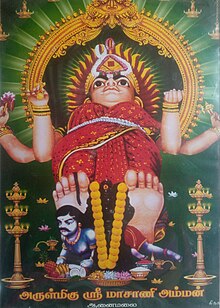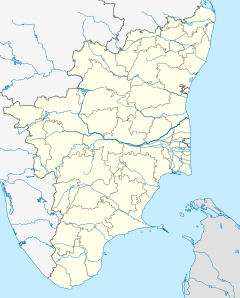| Arulmigu Sri Masani Amman Temple | |
|---|---|
அருள்மிகு ஸ்ரீ மாசாணியம்மன் திருக்கோயில் | |
 Poster depicting the main idol of Masani Amman | |
| Religion | |
| Affiliation | Hinduism |
| District | Coimbatore |
| Deity | Masani Amman (Shakti) |
| Festivals | Navaratri, Vijaya Dashami |
| Location | |
| Location | Anaimalai |
| State | Tamil Nadu |
| Country | |
| Geographic coordinates | 10°34′32″N 76°56′05″E / 10.5755701°N 76.9348486°E |
| Architecture | |
| Type | Dravidian architecture |
| Completed | before 1000 CE[1] |
| Website | |
| Official Website | |
Masani Amman is a Hindu deity. She is primarily worshipped as a family deity (kuladevi) by certain classes in Tamil Nadu, where she is regarded as an avatar (incarnation) of Adi Parashakti.[2] Her chief temple is located in Anaimalai, Pollachi area, Coimbatore district of Tamil Nadu state, India.[3][4]
Arulmigu Sri Masani Amman Temple is a highly revered shrine situated in Anaimalai, which is located about 24 km (15 mi) southwest of Pollachi. At the confluence of the Aliyar River and the Uppar stream, the temple is built on grassland near the Anaimalai Hills and enshrines the sleeping goddess Masani Amman as the presiding deity. She is seen in a unique lying posture, measuring 15 ft (4.6 m) from head to foot. In her four hands she holds a damaru with a snake entwined around it, a fire bowl, a bowl containing kumkuma, and a trident.[5] Other deities worshipped in the complex include neethi kall (stone of justice) and Mahamuniappan. It is a popular belief that Masani Amman cures any illness if one walks around her trident, which is located in front of the main sanctum.[1][6] She also provides relief from menstrual cramps.[1]



- ^ a b c "Sri Masaniamman temple". National Tamil Deity Temples. Dinamalar.
- ^ Singh, Nagendra Kr (2006). Global Encyclopaedia of the South Indian Dalit's Ethnography. Vol. 2. Global Vision Publishing House. p. 180. ISBN 978-81-8220-167-5.
- ^ "Masani Amman temple". kovaizone.in. Archived from the original on 29 January 2020.
- ^ "Masaniamman Temple". tripadvisor.in.
- ^ Cite error: The named reference
nativeplanet.comwas invoked but never defined (see the help page). - ^ Subramanian K R (29 August 2015). "மிளகாய் அரைத்து பூசினால்... நீதி வழங்கும் மாசாணியம்மன்" (in Tamil). oneindia.com.
